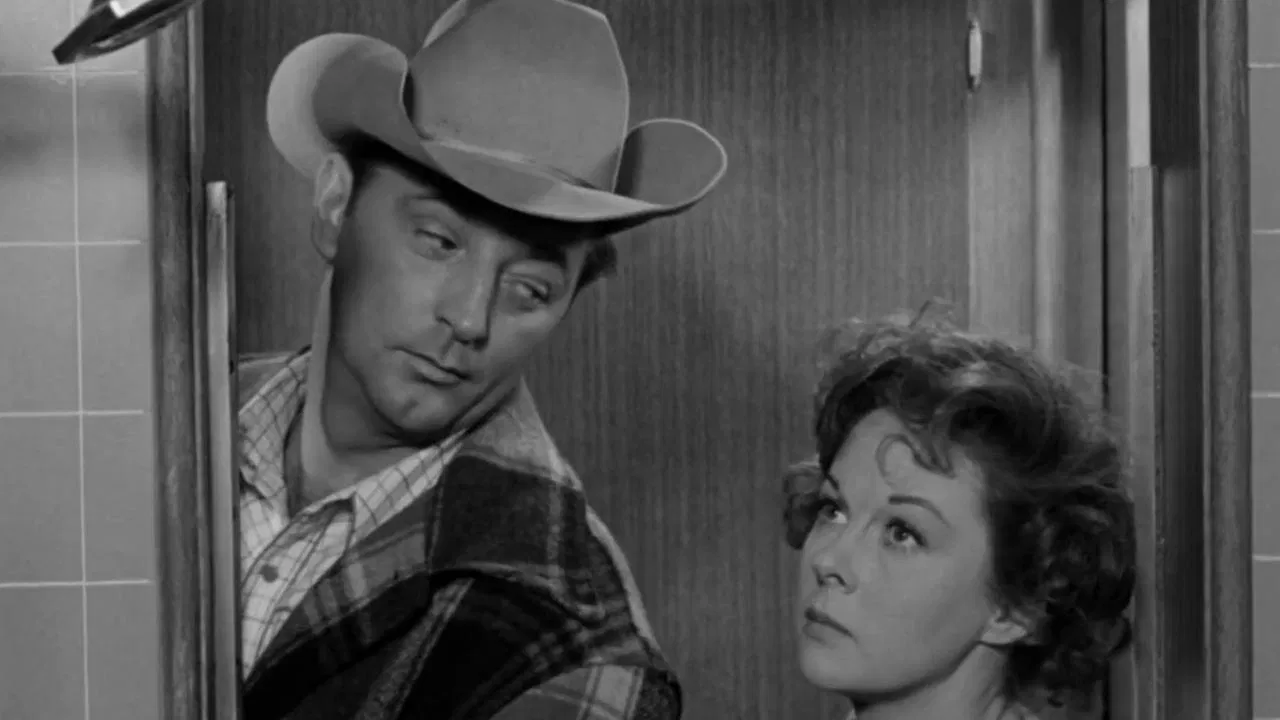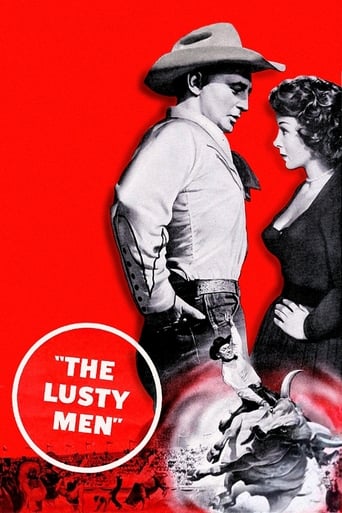

"The Lusty Men." What a deplorable title. Sounds as if it ought to star Audie Murphy, with Joan O'Brien as the mammus girl and John McIntyre as "the sheriff." But it's considerably better than that.Not that the plot is very original. An older guy takes a talented newcomer under his wing and the tyro gets an attitude. It could be Paul Newman and Tom Cruise as pool players or, more aptly, it's likely to have been drawn from a successful movie about boxing, "Champion," with Kirk Douglas.Nor is the acting especially outstanding. When Mitchum got his hands on the right role he could really swing, but here he's his usual sleepy self. Arthur Kennedy, as the talented newcomer, is good enough but the role itself is formulaic. With each successful appearance at a rodeo, busting broncos, bull dogging, calf roping, riding the Brahma bull (pronounced Bray-ma), his head expands along with his ego and he begins to neglect his loving and dutiful wife, Susan Hayward, developing instead a taste for drinking, gambling, and loose blonds. Hayward herself is miscast. She's not a slightly worn waitress from a tamale joint. That's Patricia Neal's role. Hayward projects toughness but I'm afraid she's Edythe Marrener from Brooklyn.It occurs to me that the film borrows from another pattern: the conflict between two partners in life, one of whom wants to settle down and the other who wants to keep moving and living the free life. Kirk Douglas was the rootless drifter in "Lonely Are the Brave," but he had no companion except his horse, Whiskey. A closer fit has Mitchum as the happy drifter and Deborah Kerr as the tough wife who longs for a farm in "The Sundowners." Crossing the line into the absurd, Bob Hope always wanted to go home to Sioux Falls and Bing Crosby kept coming up with plans to find a secret gold mine in the Road pictures of the 40s.There's another thing too. Mitchum is an ex prize winner at rodeos and he stumbles on Kennedy more or less by accident. Kennedy agrees to split any winnings at the contests if Mitchum shows him the ropes and teaches him the tricks. But we see NONE of that teaching. All I learned was that when you're aboard an animal in the chute and you want it to open, you shout "Outside!" And when you ride a bull you tie your left hand into place with a rope, but I already knew that thanks to a shipmate of mine in the service who was a kinsman of such a contestant. There isn't one second of Kennedy's practicing with a bucking horse or a laso. Plenty of scenes of the contests themselves, aimed at an audience who loves to see some guy thrown on his bum and mauled by a one-ton brute.So those are all the irritants. What lifts it above the average are the character touches, presumably from Horace McCoy's adaptation of Claude Stanush's novel. Whoever was responsible for the screenplay knew a thing or two about rodeos and what goes on behind the scenes. What goes on can be pretty retrograde. A man has to prove to himself and others that he's not "afraid." Kennedy often protests indignantly that he's not "scared" of being hurt.The other thing is Nicholas Ray's direction, to the extent that he can unshackle himself from the more banal parts of the script. Mitchum dies at the end. But he doesn't declare his love for Hayward on his deathbed. That love, which has only been intimated, goes unspoken. The death itself is bloodless. And instead of grimacing, then closing his eyes and rolling his head on its side -- the side facing the camera -- as almost all Hollywood's dying people do, he rolls AWAY from the camera onto his side and clutches Hayward's hands. The camera drifts up from Mitchum's naked back to Hayward's face. It's only from the change in her expression that we know he's given up the ghost. There are a couple of other scenes, equally nuanced, and if Ray had been able to get more out of Mitchum and had someone with brains and sensitivity buff the script, it could have been a very good movie indeed.
... View MoreNicholas Ray directed this excellent melodrama about ordinary folks trying to make their American Dream happen by utilizing the rodeo circuit. Arthur Kennedy and Susan Hayward star as Wes and Louise Merritt, an ordinary couple living an ordinary life as a ranch hand and a ranch hand's wife respectively. In walks Robert Mitchum as Jeff McCloud, a virile stranger who may be an opportunist and a lothario as well as an ex rodeo champion. Director Ray, known for his strong characterizations, excels at meshing the three lives of the principals in this film. Kennedy tires of ranch life just as Mitchum enters the picture, worrying his wife Hayward.Mitchum is outstanding as usual in the role of Jeff McCloud and fits right in with the rough and tumble rodeo world. Kennedy is perhaps too old to play a new rodeo star, and he certainly does not have the athleticism and physicality of Mitchum to be as believable as a rodeo star. However, Kennedy's character changes as the film progresses from an ordinary ranch hand to an egotistical star, becoming more distant from his wife's perspective. Hayward's character character changes too from a dutiful spouse to a woman willing to fight to keep her husband and in one piece. Mitchum's character change near the end is not quite believable, and as a result, the ending is not entirely satisfying.Director Nicholas Ray was always ahead of his time, focusing on characters' conflicts with themselves as well as each other; in that, the conflicts served as catalysts for action and/or change. Ray filmed the rodeo scenes with a 16 millimeter hand-held camera, a device that modern filmmakers have returned to with digital cameras in recent years in filming within close quarters, to intensify emotion/horror, or to portray an environment with more realism. Ray made an interesting choice to film in black and white in between two films in color he did: Flying Leathernecks and Johnny Guitar, mirroring the very real black and white results of his characters' decisions in The Lusty Men. Arthur Hunnicutt has a supporting role as an aging ranch hand. Horace McCoy contributed to the screenplay. *** of 4 stars.
... View MoreThis film begins with an ex-rodeo champion (Robert Mitchum) wandering around the property where he grew up--and hasn't seen in two decades. He meets up with the current owner (Burt Mustin--everybody's favorite old man) and they chat a bit--until a cowhand and his wife (Arthur Kennedy and Susan Hayward) come to Mustin's home. It seems they'd love to buy it but have little, if any, money.When Kennedy recognizes Mitchum as a rodeo star, he gets a bright idea--he can get Mitchum to train him so he can take up rodeo. That way, he reasons, he and his wife can buy the property much sooner. The problem is, Kennedy's wife hates the idea of Kennedy breaking his neck this way! Yet, despite her misgivings, he pushes ahead. Surprisingly, he is a success--and every step of the way, she is miserable as she knows it's only a matter of time until he's hurt. Throughout the film, he promises to quit...but the longer it takes, the less likely it is that he'll ever stop...until it's too late.As for the stars, they are all very good. Hayward is emotional but good (and plays a great dame), Mitchum is his easy-going self and Kennedy surprisingly macho--something you don't see very often. The script is dandy and entertaining as well--especially as you see Kennedy becoming more and more of a butt-head. I also appreciated how the rodeo footage wasn't the usual grainy footage--and they did a pretty good job of making you think it was the actors actually doing these crazy stunts. I also liked the ending--it was downbeat but worked very well.By the way, there are two bit parts to look for in the movie (aside from Mustin's). The foreman of the ranch near the beginning is Glenn Strange. While you probably won't recognize his craggy face, he's the last guy to play Universal's Frankenstein monster---having last appeared in this capacity in 1948's "Abbott & Costello Meet Frankenstein". Also, a few times throughout the film, it's Jimmy Dodd (of "The Mickey Mouse Club") playing one of the rodeo contestants. At a party later in the film he's playing a guitar. If you'd just given him some mouse ears, he would have looked more familiar.
... View MoreThe movie's a real sleeper. Rodeos were never a popular theme for Hollywood, outside of Saturday matinées. Maybe that's why the studio came up with a misleading title that cheapens expectations. The movie certainly doesn't glamorize rodeo-ing. In fact, it's a pretty scathing look at both the inside and the outside. Jeff's (Mitchum) character is brilliantly conveyed early on as he drifts across the empty field along with other wind-blown discards. He's going back to his roots now that he's quit the circuit, with no other place to go. So he hooks up with ambitious Wes (Kennedy) and his no-nonsense wife Louise (Hayward). For half of Wes's winnings, veteran rodeo-er Jeff can guide the talented newcomer as he joins the circuit. The trouble is Jeff is attracted to the loyal Louise even as Wes begins to live the fast life on his big winnings. Louise, however, only wants what she's always wanteda little spread of her and Wes's own where they can make a home. But Wes is forgetting those plans as he succumbs to the hard-partying of the rootless circuit. So, what will Louise do and just as importantly what will the love-lorn Jeff do now that the marrieds are growing apart.The partying scenes are particularly well done, conveying just the right touches of cheap booze, loose women, and tall tales. Note that telling camera angle of the grizzled Booker (Hunnicutt) as he gazes up a shapely leg from floor levelone shot can speak the proverbial volumes. Note too, the subtle way the script implies that trick-rider Rosemary has been sleepingaround, apparently an approved practice in these circles, contrary to the mores of the time (1952). Also, the shower scene when Al (Faylen) walks in is a neat bit of implied humor that depends on audience savvy for its chuckles. It's quite an intelligent screenplay, except for maybe the abrupt, but oddly satisfying, last scene. Cult director Ray oversees with his usual artistic sensibility, though it looks like he was still suffering intermittent illness since an uncredited Robert Parrish gets a credited appearance from IMDb. And, of course, Mitchum is Mitchum, so low-key here it's hard to read his feelings at any point. No, in my little book, it's Susan Hayward's movie. By golly, she's escaped that dead-end tamale shop and nothing's going to stop her little dream. The guys may be physically tougher, but none can match her inner strength, and Hayward brings it all off in thoroughly convincing fashion. I can't conceive that the movie made money, as downbeat as it is. And I wonder what audiences lured in by the lurid title thought once they saw rodeo. Nonetheless, the film remains an outstanding example of movie-making in a minor key.
... View More